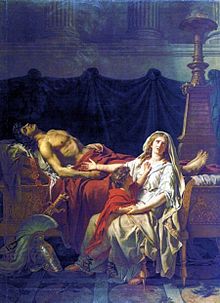
Back أندروماكا Arabic Андрамаха Byelorussian Андромаха Bulgarian Andromac'he Breton Andromaha BS Andròmaca Catalan Andromaché Czech Andromache Danish Andromache German Ανδρομάχη (μυθολογία) Greek

In Greek mythology, Andromache (/ænˈdrɒməkiː/; Ancient Greek: Ἀνδρομάχη, Andromákhē [andromákʰɛ:]) was the wife of Hector, daughter of Eetion, and sister to Podes.[1] She was born and raised in the city of Cilician Thebe, over which her father ruled. The name means 'man battler' or 'fighter of men' or 'man fighter' (there was also a famous Amazon warrior named Andromache, probably in this meaning) or 'man's battle' (that is: 'courage' or 'manly virtue'), from the Greek stem ἀνδρ- 'man' and μάχη 'battle'.[2]
Following the Trojan War, after Achilles had killed Hector and Troy had been captured and sacked by the Greeks, the Greek herald Talthybius informed her of a plan to kill Astyanax, her son by Hector, by throwing him from the city walls. This act was carried out by Neoptolemus who then took Andromache as a concubine and Hector's brother, Helenus, as a slave.[3] By Neoptolemus, she was the mother of Molossus, and according to Pausanias,[4] of Pielus and Pergamus. When Neoptolemus died, Andromache married Helenus and became Queen of Epirus. Pausanias also implies that Helenus' son, Cestrinus, was by Andromache. In Epirus Andromache faithfully continued to make offerings at Hector’s cenotaph.[5] Andromache eventually went to live with her youngest son, Pergamus in Pergamum, where she died of old age. Andromache was famous for her fidelity and virtue; her character represents the suffering of Trojan women during war.[5]
- ^ Homer, The Iliad XVII 575-590
- ^ Campbell, Mike. "Andromache". Behind the Name. Archived from the original on 10 December 2007. Retrieved 2007-11-12.
- ^ Euripides, Trojan Women
- ^ Pausanias, 1.11.1
- ^ a b Roman, L., & Roman, M. (2010). Encyclopedia of Greek and Roman mythology., p. 60, at Google Books